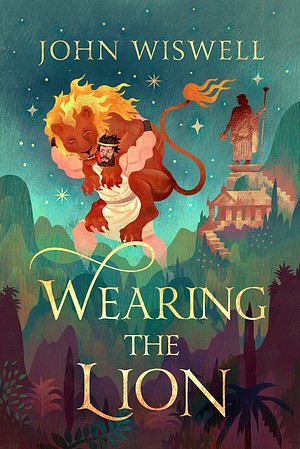
The blurb:
Heracles, hero of Greece, dedicates all his feats to Hera, goddess of family. Heracles' mother raised himto revere Hera, as her attempt to avoid the goddess' wrath. Unbeknownst to Heracles, he is yet another child Hera's husband, Zeus, had out of wedlock.
Hera loathes every minute of Heracles' devotion. She finally snaps and sends the Furies to make Heracles kill himself. But the moment Heracles goes mad, his children playfully ambush him, and he slays them instead. When the madness fades, Heracles' wife, Megara, convinces him to seek revenge. Together they'll hunt the Furies and learn which god did this.
Believing she is the only god he can still trust, Heracles prays to Hera, who is wracked with guilt over killing his children. To mislead Heracles, Hera sends him on monster-slaying quests, but he is too traumatized to enact more violence. Instead, Heracles cares for the Nemean lion, cures the illness of the Lernaean hydra, and bonds with Crete's giant bull.
Hera struggles with her role in Heracles life as Heracles begins to heal psychologically by connecting with the monsters—while also amassing an army that could lay siege to Olympos.
Someone You Can Build A Nest In was one of my favourite books last year, and I was delighted when it won a Nebula. It took a familiar sort of story—the brave hero hunting down the monster—and turned it upside down, telling it from the point of the monster, who turned out to be a quite a bit less monstrous than the monster hunters.
Wearing The Lion is completely different in some respects, retelling Greek myth—but it's also not that far away, taking a familiar tale and reshaping it into something entirely new.
The myth of Heracles and the 12 labours is pretty well-known: Zeus is his regular horndog self, fathering Alcides on a mortal woman, thereby angering Hera who sent a fit of madness on the adult Heracles, which caused him to murder his own children. The Oracle of Delphi, influenced by Hera, decreed that, to be cleansed of his crimes, he must serve another king, who imposed the famous Labours on him.
Wearing The Lion changes this around. The basic storyline is still there, but it becomes a tale about found family, grief, and facing and recovering from trauma. Heracles must come to terms with what he has done to his children—even if it was under a Fury's influence, said Fury being sent by Hera. He's a good man at heart who has been used; he's sick of violence, and just wants to know which god sent the Fury to him, and why. That it was Hera never crosses his mind; he's worshipped her almost from birth (his chosen name Heracles means "Hera's glory"), and most of the sections from his point of view are prayers to Hera, or one-sided conversations he has with her.
The journey isn't just on Heracles's end, either: Hera has her own healing to undertake. She badly misused a friend to corrupt Heracles and the death of his children was actually unintended, so she's carrying massive guilt on both fronts. Plus she's had eons of dealing with Zeus's shit and holding Olympos together. So, via the oracle, she sends Heracles on his journey to delay him finding out it was really her.
Heracles's labours become ways for him to heal a little bit. He doesn't want to kill the Nemean Lion, so he befriends it instead. He still brings the hide to the king as directed, but it's still attached to the (unharmed) lion, you get the idea. He builds a new family—not to replace his children, nobody can ever do that, but to go with him on his journeys. And it's reciprocal—every one of his new family joins him because he helps them too, they don't just help him.
That all makes it sound rather earnest, and it is—nothing wrong with that. But Wearing The Lion also has a healthy dose of sly humour along the way (in a gentle kind of way—nobody is mocked, there's no meanness in the humour).
Above everything else, though, what shines through like gold is the love and compassion Wiswell has for his characters; nobody in this story is beyond redemption if they're willing to do the work.
Started: 19 June 2025
Finished: 28 June 2025
Back home.
More books.